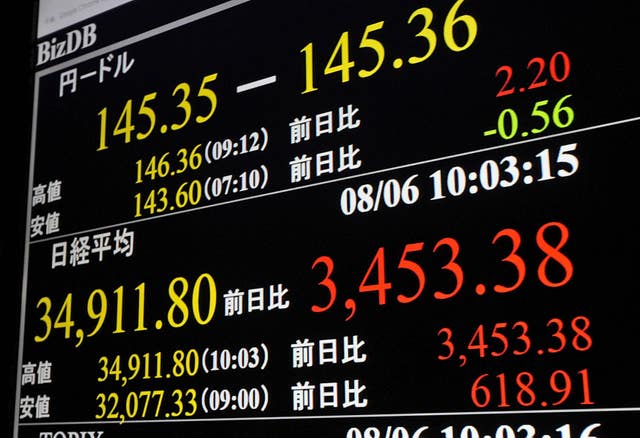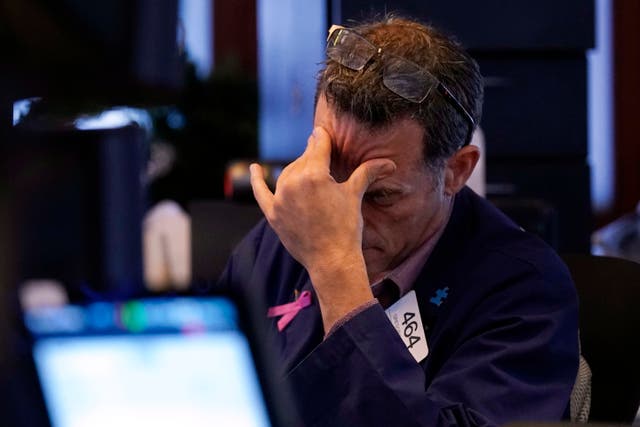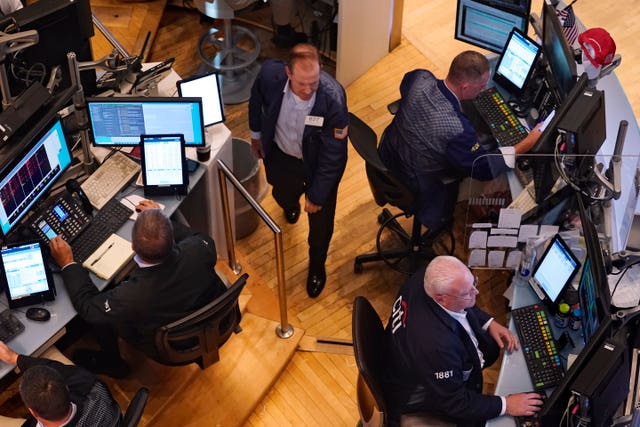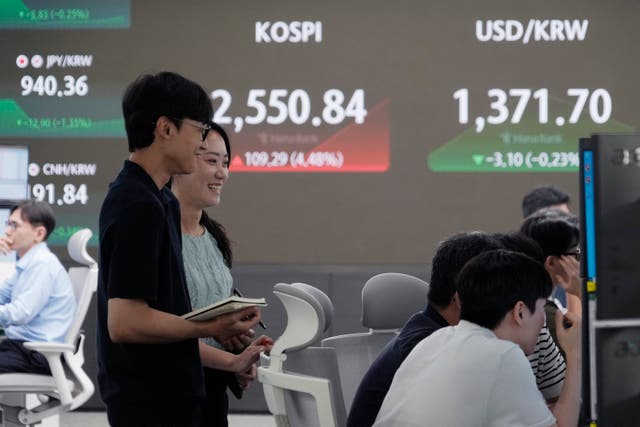Japanese stocks soar after massive sell-off that shook Wall Street
Other markets in Asia also rebounded, but more moderately, appearing to settle somewhat after the rollercoaster ride that started the week.

Japan’s benchmark Nikkei 225 index closed more than 10% higher on Tuesday, a day after it set markets tumbling in Europe and on Wall Street.
Other markets in Asia also rebounded, but more moderately, appearing to settle somewhat after the rollercoaster ride that started the week.
Monday began with a plunge abroad reminiscent of 1987’s crash that swept around the world and pummelled Wall Street with more steep losses, as fears worsened about a slowing US economy.

On Monday, the S&P 500 dropped 3% for its worst day in nearly two years, closing at 5,186.33.
The Dow Jones Industrial Average reeled by 1,033 points, or 2.6%, to 38,703.27, while the Nasdaq composite slid 3.4% to 16,200.08 as Apple, Nvidia and other Big Tech companies that used to be the stars of the stock market continued to wilt.
The drops were the latest in a global sell-off that began last week, and it was the first chance for traders in Tokyo to react to Friday’s report showing US employers slowed their hiring last month by much more than economists expected.
That was the latest piece of data on the US economy to come in weaker than expected, and it has raised fears that the Federal Reserve has pressed the brakes on the US economy by too much for too long through high interest rates in hopes of stifling inflation.
A report Monday by the Institute for Supply Management said growth for US services businesses was a touch stronger than expected, led by the arts, entertainment and recreation sectors, along with accommodations and food services.
Professional investors cautioned that some technical factors could be amplifying the neck-snapping losses.
South Korea’s Kospi index careened 8.8% lower, and bitcoin dropped below 54,000 dollars on Monday from more than 61,000 dollars on Friday.

On Tuesday, nearly all markets in Asia aside from Singapore saw gains.
The Kospi jumped 4.3% to 2,546.64. Hong Kong’s Hang Seng index was up 0.5% at 16,775.65 And in Australia, the S&P/ASX 200 edged 0.3% higher, to 7,677.50.
Taiwan’s Taiex was up 1.2% after plunging 8.4% the day before.
The Shanghai Composite index, largely bypassed by Monday’s drama, was up just over 1 point, at 2,861.87.
Monday’s meltdowns reflected fears that damage to the economy from prolonged high interest rates has been so severe that the Federal Reserve will have to cut rates in an emergency meeting, before its next scheduled decision on September 18.
The yield on the two-year Treasury, which closely tracks expectations for the Fed, briefly sank below 3.70% during the morning from 3.88% late on Friday and from 5% in April.
It later recovered and pulled back to 3.89%.

Some of Wall Street’s recent declines may simply be air coming out of a stock market that romped to dozens of all-time highs this year, in part on a frenzy around artificial-intelligence technology.
Critics have been saying for a while that the stock market looked expensive after prices rose faster than corporate profits.
Expectations for earnings are still high, with growth for S&P 500 profits this past quarter looking to be the strongest since 2021.
Upcoming US elections could further scramble things – apart from the potential impact of policies that follow the vote, market gyrations could affect the election itself.
A recession would likely put Vice President Kamala Harris on the defensive, but slower growth would sap inflation.
That would oblige former president Donald Trump to focus on ways to revive the economy instead of focusing on higher prices.
The Bank of Japan’s move last week to raise its main interest rate from nearly zero last week was another factor driving Monday’s plunge in Tokyo.

On Tuesday, the dollar was worth 145.33 yen, up from 144.17 yen late on Monday.
Surging prices for shares in Big Tech companies, like Apple, Nvidia and others known as the “Magnificent Seven”, faltered last month on worries prices had overshot expectations for their future growth. Underwhelming profits from Tesla and Alphabet added to the pessimism.
Other worries also are weighing on the market. The Israel-Hamas war and other global hotspots could cause sharp swings for the price of oil.
Early on Tuesday, US benchmark crude oil was up 1.18 dollars at 74.12 dollars per barrel and Brent crude, the international standard, advanced by one dollar to 77.30 dollars per barrel.
The euro rose to 1.0956 dollars from 1.0954 dollars.





